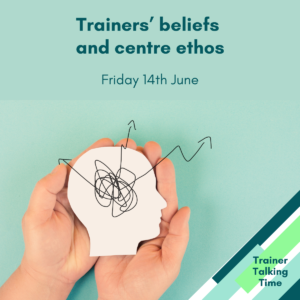These are the AI-generated notes (with bits added) from our discussion. The discussion stems from an article in The Teacher Trainer (Vol. 34 No. 1), the training journal from Pilgrims. Nick Baguley wrote an article reflecting on how seasonal trainers work within an established training set-up. In the session, we looked at six statements which relate to what we might expect from teachers in the classroom, but also reflect our own teaching philsophy.
- It’s important to pre-teach no more than 5 key vocabulary items during a receptive skills lesson.
- Teacher trainees should always ask instruction checking questions.
- Teacher trainees should either sit down or stay in one place when students are doing individual receptive skills work and only monitor during pair checks.
- It’s important to elicit answers from students for every exercise they complete.
- Teacher trainees shouldn’t ask students to read from the board when drilling.
- A fluency-based activity such as freer oral practice should always have a clear goal/communicative outcome.
Aligning Beliefs in Training Team
We discussed the importance of aligning beliefs within the training team for pre-service qualifications and onboarding staff. We debated the necessity of sharing teaching beliefs, with Teresa and Tracey arguing that as long as the fundamentals were agreed upon, different approaches were acceptable. Karen shared her approach of asking pre-service teachers to imagine themselves teaching a classroom to explore their beliefs. The group acknowledged the challenges of directly asking about beliefs but agreed that insights could be gained from observing teaching practices.
We discussed the shift from following ‘best practices’ to discovering what works best for individual teachers in their specific contexts. Karen stressed the importance of allowing trainers to experiment and learn from mistakes.
Reading aloud
Although not one of the six original statement, we discussed the challenges and effectiveness of having students read out loud for improving their pronunciation skills. We acknowledged that this approach may not enhance reading skills and could cause performance anxiety. The group debated that if the focus is on pronunciation, it would be more beneficial to identify and drill difficult words separately. Additionally, we deliberated on the potential benefits of reading aloud for first language acquisition versus second language acquisition.
ICQs
We discussed our dislike for overly detailed instructions and repetitive queries, agreeing that demonstrations and examples would be more effective in conveying information. We further debated the usefulness of asking trainees to read instructions aloud and emphasized the need for simple, clear, and concise instructions. The team also touched upon the different beliefs and practices among trainers, and the habits or actions that become ingrained over time.
Pre-teaching lexis
Karen presented her approach to teaching vocabulary, preferring to focus on ensuring students understand the questions rather than pre-teaching vocabulary, and instead using context to introduce new words. Teresa agreed with this approach, emphasizing the importance of presenting vocabulary in a relevant context.
Teresa and Karen discussed a post by Leo Gomez about the context of listening. We agreed that providing context might not necessarily improve listening comprehension. Instead, focusing on understanding the spoken words and their meanings could be more beneficial. We also discussed the role of vocabulary in language comprehension, with Teresa suggesting that vocabulary should be taught only when it is necessary to understand the text or answer questions, rather than as a standalone exercise.
Checking answers
Karen and Teresa agreed that learners need to see the value of completing controlled practice activities, but that working through each answer one-by-one is often not the most effective use of classtime. Teresa noted that she usually projects the answers, giving learners time to reflect and to ask for any clarification. Karen said that she uses monitoring as a time to identify which parts of the exercise learners may be struggling with.
Reflection questions
- How do your beliefs as a trainer impact your training?
- What onboarding systems are in place in your centre?
- Is there anything we can say is a must-do / mustn’t-do when it comes to teaching English?

1 thought on “Trainers’ beliefs and centre ethos”